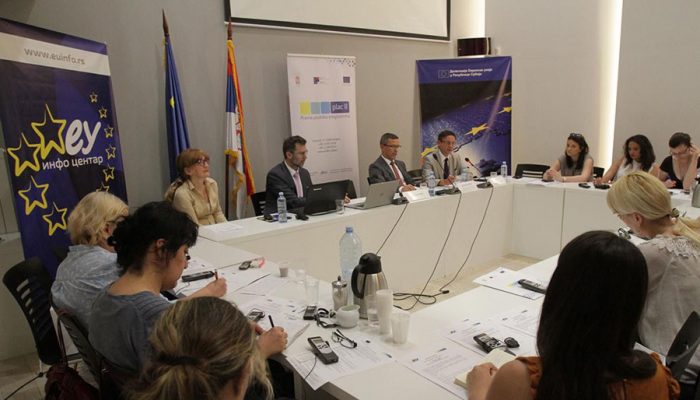 The participants in the briefing held on 22 June dedicated to negotiating chapter 11 (Agriculture and Rural Development) said that the fact that agriculture employed a large part of the workforce and accounted for a major portion of budget in the EU and candidate countries, as well as the fact that the Common Agricultural Policy accounted for a quarter of the Union acquis, spoke about the importance of the sector.
The participants in the briefing held on 22 June dedicated to negotiating chapter 11 (Agriculture and Rural Development) said that the fact that agriculture employed a large part of the workforce and accounted for a major portion of budget in the EU and candidate countries, as well as the fact that the Common Agricultural Policy accounted for a quarter of the Union acquis, spoke about the importance of the sector.
Richard Maša of the EU Delegation to Serbia told the press gathered at the EU Info Centre that the chapters 11 and 12 (Food Safety) and 13 (Fisheries), along with the chapter 27 (Environment) accounted for at least 50 per cent of the Union acquis.
Maša said that Serbia made progress in the agriculture-related chapter 11, that the screening was completed and pointed to the importance of the Joint Action Plan for the transposition of European rules into Serbian legislation as well as to the importance of building administrative capacity of ministries, agencies and other services.
Miroslav Bozic, Expert on the PLAC II project, said that the chapter 11 accounted for the most of the Union acquis, over 100,000 pages of rules, which required gradual adoption.
Bozic said that the EU budget for the period 2014-2020 envisaged EUR408 for the CAP; 77 per cent for the first pillar – direct payments and market stimuli – whereas the rest, 23 per cent, would be used to support the second pillar – rural development.
Reaping the benefits of direct payment is easier than using the funds for rural development, said Bozic, an Expert in the project PLAC II, designed to help Serbia bring its legislation into alignment with the Union acquis and implement legal acts as well as to strengthen capacity of relevant institutions in charge of conducting accession negotiations.
“That is why we should build the capacity today so that we could spend the money tomorrow,” Bozic said.
He also spoke about the Common Market Organisation in the EU that used to take up 90 per cent of the CAP budget, whereas today, it accounts for less than five per cent of the EU financial blueprint.
The CMO includes a series of measures and rules for the organisation of the single agriculture market of the EU. It includes measures envisaged under the first pillar of the CAP, with the exception of direct payments.
Bozic also spoke about the post-2020 CAP reform and its primary goals: competitive and sustainable food production; sustainable management of resources; and balanced territorial development.
Advisor to the Minister in charge of European integration Danilo Golubovic said that the CAP, which outlined binding rules for all EU members, was one of the first common EU policies.
He said that by aligning the legislation in the area of agriculture Serbia would be given access to the single market and more consumers once it has joined the EU. Also, Serbian farmers would enjoy more support, whereas the competition would be regulated.
Serbia is building capacity for IPARD
Serbia is working round the clock to overcome the deficiencies noted by the European Commission regarding the capacity of the Directorate for Agrarian Payments, whose well-functioning is a precondition for using the EU pre-accession funds in the area of agriculture (IPARD), said Danilo Golubovic of the office of the Minister in charge of European integration.
Following the EC’s review, everyone engaged in the process from the ministries of agriculture and finance is working to remedy the shortcomings, Golubovic said.
Golubovic said that the Government formed the IPARD group, headed by the Ministry of Finance, which meets every two weeks to take stock of the progress.
“A lot has been done so far and the things are moving in the right direction,” Golubovic told the press in the margins of the briefing dedicated to the chapter 11.
He added that the reconstruction of Srbijasume central building, where the first two measures under the IPARD programme will be implemented, was underway.
The reconstruction should be finished in August; we will then invite the EC to conduct another review, he said.
“We cannot tell with certainty when the review would take place, it depends on the EC. We will inform the public about the activities once we have implemented them because we do not want to tell anything beforehand,” Golubovic said, adding that “certain things are beyond our control”.
In parallel, the staff of the Directorate for Agrarian Payments is currently undergoing trainings, he said.
“The public is eager to start signing up for IPARD, but what’s equally important is to do this job right,” Advisor to the Minister in charge of European integration concluded.
The first individual calls within the IPARD II should be launched next fall. IPARD II is an EU programme aimed at providing non-refundable aid in the area of rural development in the period from 2014-2020 worth nearly EUR230 million.
Source: europa.rs
 Government of the Republic of Serbia
Government of the Republic of Serbia















 pdf [271 KB]
pdf [271 KB]
Leave a Comment